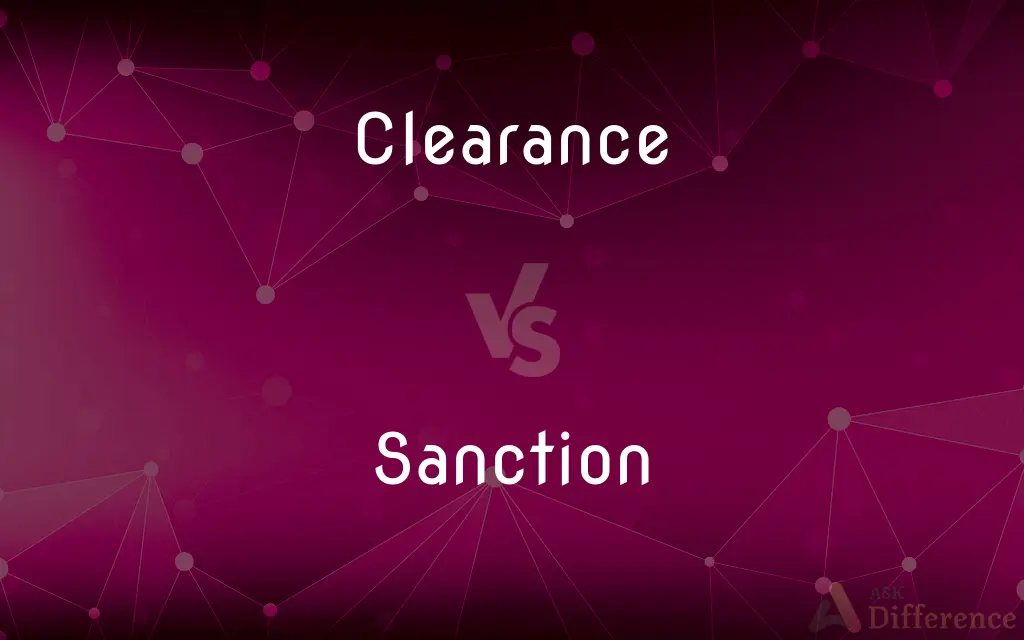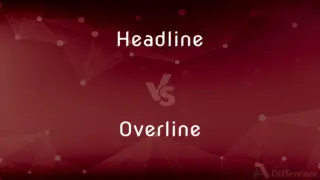Clearance vs. Sanction — What's the Difference?
Edited by Tayyaba Rehman — By Fiza Rafique — Updated on April 17, 2024
Clearance generally means official authorization or approval for an action, while sanction can mean either a penalty for disobeying a law or approval for an action.

Difference Between Clearance and Sanction
Table of Contents
ADVERTISEMENT
Key Differences
Clearance is typically granted after verifying that specific criteria or regulations have been met, enabling a person or entity to proceed with an activity or operation. Whereas, sanction can refer to either punitive measures taken against individuals or entities to enforce compliance with laws or regulations, or it can mean formal approval for specific actions or policies.
In terms of usage, clearance is often used in contexts like security, where individuals are granted access to restricted areas, or in administrative processes where approval is needed to move forward with projects. On the other hand, sanction in the context of approval is similar, but when it refers to penalties, it is used primarily in legal, political, or international relations contexts to describe actions taken to penalize or restrict behaviors.
The process of obtaining clearance usually involves a thorough review and adherence to predetermined standards, which are typically transparent and specific to the activity at hand. Conversely, imposing sanctions as penalties involves a decision by authoritative bodies like governments or international organizations, aimed at correcting or deterring undesirable actions.
Clearance is inherently a facilitative process, aimed at ensuring safety, security, and compliance before an activity is undertaken. Sanction, when used to denote approval, functions similarly, but as a penalty, it is restrictive, aiming to limit or prevent certain actions due to non-compliance or breaches.
While clearance is generally a positive and enabling authorization, sanction as a penalty carries a negative connotation, implying restriction, punishment, or corrective measures designed to influence behavior or decisions in a desired direction.
ADVERTISEMENT
Comparison Chart
Definition
Authorization to proceed
Approval or penalty
Usage Context
Security, administration
Legal, political, international
Purpose
To enable or allow
To approve, restrict, or penalize
Process
Review against standards
Decision by authorities
Connotation
Positive, enabling
Dual: positive or negative
Compare with Definitions
Clearance
Necessary authorization for a pilot to take off or land.
The flight waited on the tarmac until it got clearance from air traffic control.
Sanction
Measures taken by a state or organization to coerce another to comply with certain laws or regulations.
International sanctions were applied to curb the nation's nuclear activities.
Clearance
Confirmation that a path or space is free of obstacles or hindrances.
The road crew got clearance to remove the fallen tree.
Sanction
Official permission or approval for an action.
The board gave its sanction to the new development plan.
Clearance
Official authorization for someone to access certain areas or information.
He received security clearance to work on the classified project.
Sanction
A coercive action to enforce legal or policy compliance.
The university imposed sanctions on the students involved in the scandal.
Clearance
Approval process to ensure compliance with standards before proceeding.
The new building received clearance from the city council.
Sanction
A penalty imposed for disobeying a law or rule.
Economic sanctions were imposed on the country following its policy changes.
Clearance
Verification that a person or company meets certain conditions to engage in an activity.
She passed the background check and got clearance for the new job.
Sanction
Judicial or organizational approval.
The project received official sanction after thorough review.
Clearance
The action or process of clearing or of being dispersed
Cleaning of the machine should include clearance of blockages
There will be sunny intervals after clearance of any early mist
Sanction
Authoritative permission or approval that makes a course of action valid.
Clearance
Official authorization for something to proceed or take place
The aircraft hadn't got diplomatic clearance to land in Mexico
Sanction
Support or encouragement, as from public opinion or established custom.
Clearance
Clear space allowed for a thing to move past or under another
Always give cyclists plenty of clearance
Sanction
A consideration, influence, or principle that dictates an ethical choice.
Clearance
The act or process of clearing.
Sanction
The penalty for noncompliance with a law or legal order.
Clearance
A space cleared; a clearing.
Sanction
A penalty, specified or in the form of moral pressure, that acts to ensure compliance with a social standard or norm.
Clearance
The amount of space or distance by which a moving object clears something.
Sanction
A coercive measure adopted usually by several nations acting together against a nation violating international law.
Clearance
The height or width of a passage
An underpass with a 13-foot clearance.
Sanction
To give official authorization or approval to
Voting rights that are sanctioned by law.
Clearance
An intervening space or distance allowing free play, as between machine parts.
Sanction
To encourage or tolerate by indicating approval
His colleagues sanctioned his new research.
Clearance
Permission for an aircraft, ship, or other vehicle to proceed, as after an inspection of equipment or cargo or during certain traffic conditions.
Sanction
To penalize, as for violating a moral principle or international law
"Half of the public defenders of accused murderers were sanctioned by the Texas bar for legal misbehavior or incompetence" (Garry Wills).
Clearance
Official certification of blamelessness, trustworthiness, or suitability.
Sanction
An approval, by an authority, generally one that makes something valid.
The whalers had been operating in the contested waters off the island with sanction from the Japanese government.
Clearance
A sale, generally at reduced prices, to dispose of old merchandise.
Sanction
A penalty, punishment, or some coercive measure, intended to ensure compliance; especially one adopted by several nations, or by an international body.
The United States enacted a new round of sanctions against the apartheid regime of South Africa.
Clearance
The passage of checks and other bills of exchange through a clearing-house.
Sanction
A law, treaty, or contract, or a clause within a law, treaty, or contract, specifying any of the above.
Clearance
Renal clearance.
Sanction
(transitive) To ratify; to make valid.
Clearance
The act of clearing or something (such as a space) cleared.
Sanction
(transitive) To give official authorization or approval to; to countenance.
Clearance
The distance between two moving objects, especially between parts of a machine
Sanction
(transitive) To penalize (a state etc.) with sanctions.
Clearance
The height or width of a tunnel, bridge or other passage, or the distance between a vehicle and the walls or roof of such passage; a gap, headroom.
Sanction
Solemn or ceremonious ratification; an official act of a superior by which he ratifies and gives validity to the act of some other person or body; establishment or furtherance of anything by giving authority to it; confirmation; approbation.
The strictest professors of reason have added the sanction of their testimony.
Clearance
A permission for a vehicle to proceed, or for a person to travel.
The plane got clearance from air traffic control, and we were off.
He got clearance to travel to America, even though he had previous links to terrorists.
Sanction
Anything done or said to enforce the will, law, or authority of another; as, legal sanctions.
Clearance
A permission to have access to sensitive or secret documents or other information.
Sanction
To give sanction to; to ratify; to confirm; to approve.
Would have counseled, or even sanctioned, such perilous experiments.
Clearance
A permission to use something, usually intellectual property, that is legally, but not otherwise, protected.
Sanction
Formal and explicit approval;
A Democrat usually gets the union's endorsement
Clearance
(retail) A sale of merchandise, especially at significantly reduced prices, usually in order to make room for new merchandise or updated versions of the same merchandise.
Sanction
A mechanism of social control for enforcing a society's standards
Clearance
The settlement of transactions involving securities or means of payment such as checks by means of a clearing house.
Sanction
Official permission or approval;
Authority for the program was renewed several times
Clearance
The act of potting all the remaining balls on a table at one visit.
Sanction
The act of final authorization;
It had the sanction of the church
Clearance
(soccer) The act of kicking a ball away from the goal one is defending.
Sanction
Give sanction to;
I approve of his educational policies
Clearance
(chess) Removal of pieces from a rank, file or diagonal so that a bishop, rook or queen is free to move along it.
Sanction
Give authority or permission to
Clearance
Clear or net profit.
Sanction
Give religious sanction to, such as through on oath;
Sanctify the marriage
Clearance
(Australian rules football) The first disposal in a chain that leaves the area of a stoppage, or a disposal that leaves the area of a stoppage itself.
Clearance
(Australian rules football) The act of leaving the area of a stoppage.
Clearance
The act of clearing; as, to make a thorough clearance.
Clearance
A certificate that a ship or vessel has been cleared at the customhouse; permission to sail.
Every ship was subject to seizure for want of stamped clearances.
Clearance
Clear or net profit.
Clearance
The distance by which one object clears another, as the distance between the piston and cylinder head at the end of a stroke in a steam engine, or the least distance between the point of a cogwheel tooth and the bottom of a space between teeth of a wheel with which it engages.
Clearance
The distance by which one thing clears another; the space between them
Clearance
Vertical space available to allow easy passage under something
Clearance
Permission to proceed;
The plane was given clearance to land
Common Curiosities
What types of sanctions can governments impose?
Governments can impose various types of sanctions including economic, diplomatic, or military measures to influence or penalize other nations or entities.
What is the purpose of clearance in a professional setting?
Clearance in a professional setting typically ensures that individuals have the necessary approval to access specific areas or information, maintaining security and compliance.
What are the consequences of not obtaining necessary clearance?
Failing to obtain necessary clearance can result in denied access, halted projects, or legal repercussions depending on the context.
Can a company face both clearance and sanctions issues?
Yes, a company might need to obtain clearance for certain operations while also facing sanctions if it fails to comply with relevant regulations.
How do international sanctions impact global relations?
International sanctions can significantly impact global relations, often leading to diplomatic tensions but also potentially prompting changes in policy or behavior of the targeted nations.
How does a sanction function as a penalty?
As a penalty, a sanction serves to penalize individuals or entities for non-compliance with laws or policies, aiming to enforce rules and deter undesirable actions.
How can an individual obtain clearance for classified information?
Individuals must undergo rigorous background checks and meet specific security criteria to obtain clearance for classified information.
How do sanctions affect ordinary citizens?
Sanctions, especially economic ones, can have broad effects, potentially leading to economic hardships for ordinary citizens of the targeted country.
What role do international bodies play in sanctions?
International bodies, such as the United Nations, often play a crucial role in imposing sanctions, which are intended to maintain or restore international peace and security.
Who grants clearance for sensitive government jobs?
Clearance for sensitive government positions is typically granted by national security agencies after thorough background checks.
Is clearance always required for international travel?
For certain types of travel, such as diplomatic or business, specific clearances may be required in addition to visas.
What are common reasons for a business to receive sanctions?
Common reasons include violations of laws, regulatory non-compliance, unethical practices, or security breaches.
What is environmental clearance?
Environmental clearance is the process of assessing the environmental impacts of a proposed project and obtaining approval to proceed if it meets specific environmental standards.
Are there ethical considerations in the imposition of sanctions?
Yes, the imposition of sanctions involves ethical considerations, particularly regarding their fairness, proportionality, and the impacts on civilians.
Can sanctions be lifted or removed?
Sanctions can be lifted or removed if the targeted individual or entity complies with the stipulated conditions or if the issuing body deems it appropriate based on changes in circumstances.
Share Your Discovery

Previous Comparison
Headline vs. Overline
Next Comparison
Leo vs. AriesAuthor Spotlight
Written by
Fiza RafiqueFiza Rafique is a skilled content writer at AskDifference.com, where she meticulously refines and enhances written pieces. Drawing from her vast editorial expertise, Fiza ensures clarity, accuracy, and precision in every article. Passionate about language, she continually seeks to elevate the quality of content for readers worldwide.
Edited by
Tayyaba RehmanTayyaba Rehman is a distinguished writer, currently serving as a primary contributor to askdifference.com. As a researcher in semantics and etymology, Tayyaba's passion for the complexity of languages and their distinctions has found a perfect home on the platform. Tayyaba delves into the intricacies of language, distinguishing between commonly confused words and phrases, thereby providing clarity for readers worldwide.














































